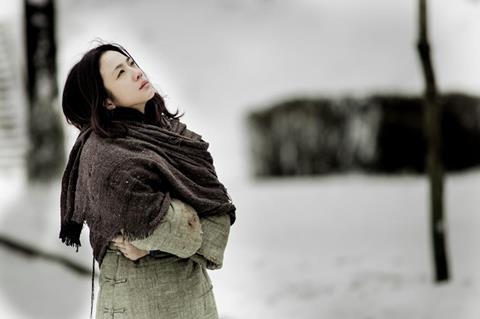Dir: Ann Hui. China-Hong Kong. 2014. 178mins

Following the life of Chinese female novelist and essayist Xiao Hong, Ann Hui’s biopic The Golden Era (Huangjin shidai) provides a fascinating look at her relatively short and eventful life set against the turbulent Chinese backdrop of the 1930s, but the film’s excessive scope and three-hour duration ultimately makes it a hard sell, especially for international audiences unfamiliar with early-mid nineteenth century Chinese history.
She manages to orchestrate an unconventional biopic that explores the life of prolific writer while adding layers in terms of the historical context, but by doing this, Hui’s feature isn’t able to engage with the audience it seeks to attract.
Starring Tang Wei (Lust, Caution), the film, which was released on October 1 in China, could find a local audience who are willing to endure the epic length. But, while it will find a home on the festival market after closing in Venice, screening in Toronto along with a gala presentation in Busan ahead of its South Korean release, it will likely have a harder time attracting an audience outside festival screenings unless it can be made more accessible.
Beginning in somewhat of an unconventional fashion with Xiao Hong (Tang Wei) talking to the camera in black and white immediately revealing where and when she was born and died; it then is followed by fellow writers giving their reflections along with letters shared between her and her main lover Xiao Jun (Feng Shao Feng) that continues throughout the film as the film explores her life.
In doing so, the film reveals how she ran away from home to escape her abusive father and arranged marriage in Manchuria, and how she then falls in love with a teacher only for him to abandon her leaving her with a large hotel bill she cannot afford. Coming to her rescue after she writes a letter to the International Gazette paper is the editor, Xiao Jun who encourages her to write, and they begin a serious relationship, but amidst the Second Sino-Japanese War, their bond begins to fracture as their priorities shift.
Ironically despite focusing so much on Xiao Hong’s life, the film fails to look at her work in any significant depth, yet the film also paints an extensive portrait of this era and how it affected her life and those closest to her in a remarkably detailed manner. For many, this will be too much information to digest, but few films could offer such a comprehensive examination of this turbulent period.
Interestingly, therefore, where Hong Kong filmmaker Ann Hui succeeds, she also fails. She manages to orchestrate an unconventional biopic that explores the life of prolific writer while adding layers in terms of the historical context, but by doing this, Hui’s feature isn’t able to engage with the audience it seeks to attract.
Technically, however, Hui’s latest doesn’t fail to impress in both its scale and its execution in terms of visuals and sound design capturing the volatile backdrop, but it’s also in the film’s quieter periods where Hui delivers the more profound moments essentially creating the film’s largely reflective mood.
One of Hui’s greatest assets is her production team, but so is Tang Wei who essentially carries the film and though the weight of the film’s huge scope only serves to weaken her role, she once again demonstrates her ability to take on extremely challenging and nuanced roles.
Perhaps, it shouldn’t come as a surprise that such a film given its technical prowess and its historical backdrop is being put forward as Hong Kong’s entry for the Best Foreign Language film at the 87th Academy Awards, which despite its problems should aid in its exposure both locally and internationally.
Production company: Stellar Mega Films Ltd
International sales: Edko Films Ltd, info@edkofilm.com.hk
Producers: Qin Hong, Zhao Hai Cheng, Wang Yan Ning, Yang Grace
Executive producer: Li Qiang, Yuan Mei, Han Xiao Li, Zhang Wei, Yuan Xin, Zhang Feng Kui, Lin Ling
Screenplay: Li Qiang
Cinematography: Wang Yu
Editor: Wai Manda
Production designer: Zhao Hai, Man Lim Chung
Music: Eli Marshall
Main cast: Tang Wei, Feng Shaofeng















![[L-R]: Amanda Villavieja, Laia Casanovas, Yasmina Praderas](https://d1nslcd7m2225b.cloudfront.net/Pictures/274x183/6/4/1/1471641_pxl_20251224_103354743_618426_crop.jpg)





